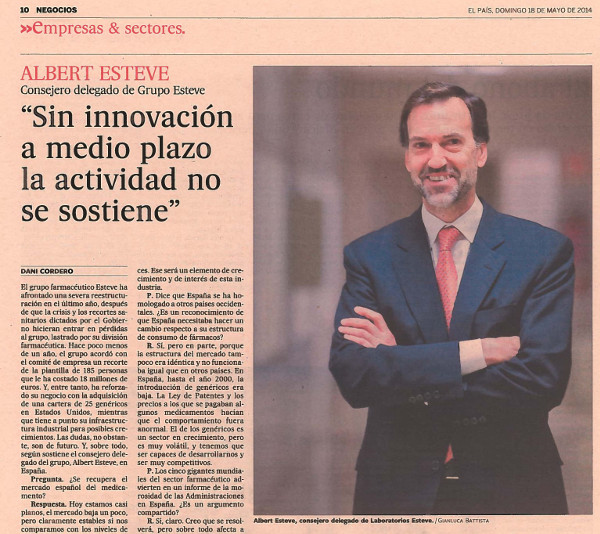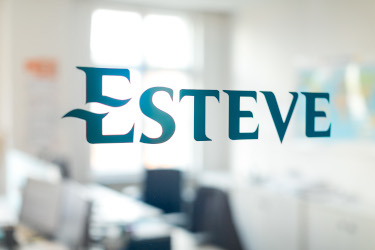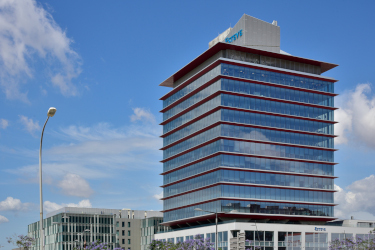18/05/2014
ACTIVITY CANNOT BE SUSTAINED WITHOUT MID-TERM INNOVATION
ALBERT Esteve - Esteve Group CEO

The Esteve pharmaceutical group has faced a severe restructuring process in the past year. Handicapped by its pharmaceutical division, the group incurred losses due to the crisis and to Government-dictated health cuts. A little less than one year ago, the group and the works council agreed making 185 people redundant, at a cost of 18 Million Euros. In the meantime, the group has strengthened its portfolio with the acquisition of 25 generics in the United States, and has its industrial infrastructure ready for possible growth. The future, however, is in doubt. "Particularly in Spain", Group CEO Albert Esteve maintains.
- Is the Spanish pharmaceutical market seeing any recovery?
We're seeing an almost flat market, going down a little, but clearly stable as compared to the reduction levels of one year ago, which were of 18%. If the economy grows around 1% this year, some of the stress related to downward price regulation and other regulations might disappear. If it does, we may be seeing growth trends in one or two years.
- Esteve was particularly affected. Turnover rates fell in the last years and finally losses were incurred.
True. We were most affected between 2010 and 2012 because two of our main products lost their patent exclusivity. This is a sectoral-level variable.
- Do you think the Spanish market will be able to go back to the levels they were five or six years ago?
I don't think so. The market has been brought into alignment with other western markets on account of the arrival of generics, and this will not change. The trend is that, in the western market, generics will continue covering diseases properly treated with a category of drugs that have been marketed for some years now. These diseases include hypertension, cholesterol monitoring, or diabetes. There are, however, other future new therapies (e.g. in oncology) that are not well treated and that are to see major development. This will be a growth factor and an element of interest of this industry.
- You say that Spain has been brought into alignment with other western countries. Are you recognizing that Spain needed to change its drug consumption structure?
Yes, but only in part, because the market structure was not identical and did not operate as in other countries. In Spain, the production of generic drugs was low until the year 2000. The Patent Act and the prices paid for some drugs resulted in an abnormal behavior. While the generics sector is growing, it is an extremely volatile one and we must be able to develop our company and be very competitive.
- A report issued by the top 5 pharma giants warns of default of the Spanish Administrations. Do you share this view?
Of course I do. I think this will be solved. Default, however, mainly affects a very specific part of the industry ―that which operates in hospitals― and the problem is not new. Pharmacies are not affected to the same extent.
- Esteve initiated major restructuring one year ago.
The market has changed substantially and we have done our homework. It is not just about a downsizing plan: market dynamics have changed and we had to adapt accordingly.
- How successful was it?
Restructuring our pharmaceutical activity and adapting to the new context was necessary to ensure R&D investment. The pharmaceutical activity in Spain is not sustainable without mid-term innovation. We intend to be global.
- Is the future at risk due to the cuts in the pharmaceutical structure?
We'll find out in about ten years. Clearly less R&D resources have been used, and the risk is that R&D is precisely that which must prompt investment for growth five to ten years from now.
Esteve bought the generics portfolio from US Company Cypress Pharmaceuticals. Is this the model to be followed?
This is a highly dynamic sector. Peculiar as it may be, we think our generics model is the right one. On the one hand, this involves development activities to make generics that provide a differential element: we have production plants and then we sell (under the Pensa brand). On the other hand, we are also present in the United States. Having a constantly optimized portfolio is a clever policy, and that's what buying Cypress was about. In the generics market you need to carefully control the product life cycles ―which are short by definition and very competitive as related to costs. Therefore, we must be able to develop our portfolio and assume what the market requires from us. Cypress complements our company: 25 new products, of which 16 are in the development phase. Our US subsidiary is thus provided with great potential for portfolio substitution in the coming three to four years.
- Does this mean that they are compelled to buy generics every four years?
If you are unable to renew your portfolio with in-house research, then you must buy or license products.
- Are you considering new acquisitions?
No, we're not. Our people, however, are constantly analyzing the market. We are beginners in the generics market ―we've been in this market only since 2006.
- Do you need to buy production plants?
Our industrial platform clearly evidences that we have no need to buy. We have four plants in three different continents, all approved by the FDA, in times when many other plants are called into question. For example, our plant in China is running at one third capacity.
- One always hears about mergers in the Spanish market, but none is finalized.
Mergers are based on complementarity. I think that the Spanish companies are not complementary. We fail to see any element of synergy. What companies must do with their lines of business is quite another thing. Creating a large company focusing on the Spanish market would be another possibility, but this makes no sense in the current situation.
- What about opening up Esteve's capital?
We have decided not to. It may be possible in the future, but our business plan is assumed by the family and we feel very comfortable this way.



